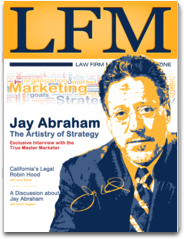In today’s video, you’ll meet America’s Top Trial Lawyer Genie Harrison of Genie Harrison Law Firm in Los Angeles, California. Mr. Swanson interviews her about tracking emotional damages and her new app that will help attorneys do so.
Malpractice Insurance: Do You Really Need It?

I recently came across an article by Brain Tannebaum. It’s based on his interview with Sam Cohen, from Attorneys First, about malpractice insurance for attorneys. Brain does a good job of covering the basic questions a lawyer might have. I thought it might be very useful to a new attorney wondering about malpractice insurance. Brian covers several points during the article, some of which are:
- Which attorneys don’t need malpractice insurance.
- What malpractice insurance covers.
- Considerable options for attorney coverage.
To find out what other advice is Sam shares, view the full article here.
Trial Reviews How David Beats Goliath

How David Beats Goliath – Access to Capital for Contingent-Fee Law Firms was reviewed in the June 2012 publication of Trial. Reviewer Douglass F. Noland gave a very thorough, detailed and fair review of the book. Here are a few brief excerpts:
“Author Michael Swanson’s How David Beats Goliath is a must-read for any lawyer who works on contingent-fee cases.”
“Swanson explains, in a straightforward way, how to maintain your firm’s cash flow and how to level the playing field against your opponents.”
“If Swanson’s strategy is applied faithfully, lawyers may lessen their worries about financing their cases, so they can concentrate more on the cases themselves.”
To read the complete review, click here. To purchase a copy of How David Beats Goliath, click here.
Harnessing the Power of Tax Deferral for Contingent Legal Fees

Today’s guest blogger is Jason D. Lazarus, Esq. of Synergy Settlement Services. I invited Jason to explain a few techniques that I’ve seen many successful contingent-fee lawyers use to help manage their income stream, tax burden and even plan for retirement. I hope this is helpful to you.
By Jason D. Lazarus, J.D., LL.M.
Lawyers who earn contingent legal fees have a unique ability to control the timing of their income with either attorney fee structures or deferred compensation arrangements. While many lawyers fail to consider these vehicles due to lack of information, it is easy to see once one understands the options how powerful this can be for contingent legal fees. Through these mechanisms, a lawyer can forego taxation of fees earned in one tax year and spread out the income over a number of subsequent tax years. It allows a contingent fee to be paid out over time and taxed in the years each payment is received instead of in year one. This method was born out of the landmark tax decision in Childs v. Commissioner[1]. In the Childs case, the IRS challenged just such an arrangement. The IRS ultimately lost in the 11th Circuit. Since it was decided in 1996, Childs has not been challenged by the Service and has even been cited by the IRS as a precedent in a recent Private Letter Ruling[2]. According to Robert Wood, the preeminent expert on taxation of damages, “the IRS has begun uniformly citing Childs favorably, and is apparently quite comfortable with this.”[3]
The benefits of using an attorney fee tax deferral program regularly are significant. First, it allows a trial lawyer to even out what usually can be uneven cash flows. Controlling timing of income is a huge advantage over other professions where it can’t be controlled. Since a lawyer can defer only part of their fee if they so choose, there is complete control over the income a lawyer takes in any given year. In addition, there is no requirement that the client structure their monies or participate in any way with their attorney. Second, fees are invested pre-tax allowing one hundred percent of the money to earn interest and no tax is due until distributions begin. Third, it can help lower the overall tax burden by spreading taxation out over a longer period of years when hopefully the lawyer is in a lower tax bracket. It can also possibly avoid application of the Alternative Minimum Tax (AMT). Fourth, the future periodic payments from the fee structure or the nonqualified deferred compensation arrangement can be planned out to match future needs such as college tuition for children, large expenditures or retirement. The periodic payments can also be paid in the short term to assist with immediate cash flow. . Lastly, there are no limits on the amounts to be deferred or restrictions on distributions like qualified retirement plans.
There are two different mechanisms that can be used to defer taxation of fees. The first is an attorney fee structured settlement and the second is a nonqualified deferred compensation plan using a CaR trust. For an attorney fee structure, the fee is deferred through either a qualified or non-qualified assignment. A qualified assignment utilizes a fixed annuity and pays out over a specific time period or life depending on the plan selected by the lawyer. A non-qualified assignment may use a fixed annuity, high yield fixed payment rights or securities. With any type of fee structure, the fees must go directly from the defendant to the assignment corporation like a traditional structured settlement. Special language must be included in the release and an assignment document must be executed. The terms of the lawyer’s future periodic payments from the fee structure must be contained in the release.
With a nonqualified deferred compensation plan using a CaR trust, the fee is deferred by having the defendant pay the fee to the plan administrator. The investments inside the trust may be selected by the attorney and can include securities based investments as well as high yield fixed payment rights. The deferral program goes for 20 quarters with the first payment deferred 5 quarters. Each quarterly bucket is credited with investment earnings. When it is due to be paid, it can either be paid out in full, partially or deferred. If it is deferred, it goes to the end of the line of the 20 quarters worth of buckets. This allows a lawyer to elect not to receive payments at any given time if their current income necessitates more deferral. For example, a lawyer has a great year and can then decide he does not want any buckets in that particular year. With a nonqualified deferred compensation plan there is no need for an assignment or special language in the release. The details of the arrangement do not have to be disclosed in the settlement documents. The defendant would still have to make out a check to the deferred compensation plan. A nonqualified deferred compensation program can be used to retain key lawyers in a firm and potentially can be used for borrowing purposes.
The beauty of both fee structures and nonqualified deferred compensation plans is that there are no limits on the amount you can defer or participation requirements like with qualified plans. An attorney can also develop a strategy using a portion of each fee earned to create a significant amount of pre-tax and tax deferred investments. For example, a firm I work with takes a small portion of each fee ($25 to $50k) and sets up deferred fee structures. Over a 10 year period they accumulated over $1 million in deferred attorney fee structures. However, because both the fee structure and nonqualified deferred compensation plans are complex planning tools, you should employ an experienced planner to walk you through the options and develop a strategy. Both options have pros and cons. They both have technical requirements which require the help of experts. Learn more about how to maximize the fees you earn and harness the power of pre-tax and tax deferred investment options for contingent fees.
- To learn more about tax deferral of contingent attorney fees, visit www.structuredfees.com
- To learn more about Synergy Settlement Services, visit www.synergysettlements.com
[1] 103 T.C. 634 (1994), aff’d without opinion 89 F.3d 856 (11th Cir. 1996).
[2] PLR 150850 (2008)
[3] Legal Fee Structures Can Hedge the Insecurities Many Lawyers Face, Los Angeles Daily Journal (Friday August, 28, 2009) at P. 6.
Advocate Capital, Inc.

Advocate Capital, Inc., is a commercial finance company that was founded in 1999. Our main focus is providing an alternative to the “interest free” loans that most trial lawyers make to their firms for case expenses. We do this through a unique combination of commercial lines-of-credit and specialized accounting services.
Our clients are the best and the brightest of trial law firms from all over the United States. Our typical client-firm is a well established, experienced trial law firm whose partners are high-net-worth attorneys at the “top of their game”. Many are leaders of state and national trial lawyer associations, and quite a few are authors and expert speakers in the profession.
Advocate Capital, Inc., has enjoyed consistent, rapid, profitable growth during its history and now has clients in over 35 states. We look forward to adding you to our family of satisfied clients!
Website: www.advocatecapital.com
Gerry Oginski, Esq.

Gerry is a practicing NY Medical Malpractice & Personal Injury Attorney in one of the most competitive markets in the Country.
He is the author of “Secrets of Lawyer Video Marketing in the Age of YouTube,” and lectures to thousands of lawyers across the country each year, has written hundreds of articles on video marketing for attorneys and is considered the leading authority on video marketing for lawyers.
He has personally created over 1350 educational videos to teach his potential clients how cases involving medical malpractice & accidents work and is the Founder of the Lawyers Video Studio, where he has helped lawyers across the United States create over 3500 videos to market their law firms.
Gerry has used video marketing to generate settlements of over $8.6 million dollars for his own solo practice.
25 Great Neck Rd., Ste. 4
Great Neck, NY 11021
516-487-8207
Website: http://LawyersVideoStudio.com
Unsure of How to Shop for Disability Insurance?

Most people never think about the fact that a lawyer with his own firm as a small business owner. But in fact, that’s the way it is for many lawyers, whether they’re a partner, or a sole practitioner. You deal with multiple cases, handle your payroll and taxes, and manage all of the things a business needs. One of those needs being disability insurance. And anyone who has been around personal injury cases knows that having decent disability insurance can go a long way.
I recently came across an article by Darrell Zahorsky called “11 Tips For Buying Small Business Disability Insurance.” If you happen to be in the market for such insurance, click the link above to check out his article. It covers things such as:
- Defining disability
- Determining disability type
- Looking at financial ratings
And more. Give it a read. It might even come in handy for someone you know.
Photo Credit: 123RF Stock Photo
A Few Simple Rules for Mediation

If you are like most lawyers, you have probably used mediation as a means to resolve a legal dispute. Sometimes it can be in your party’s best interest to avoid trial, though there are a lot of times when you might find it difficult to come out as successful as you would’ve liked. Kendall Reed, a contributor with www.NOLO.com, came up with ten simple rules that can help a lawyer be successful with mediation. Take a look at the first five below. They may seem like common sense, but odds are they will help.
- The decision makers must participate.
- The important documents must be physically present.
- Be right, but only to a point.
- Build a deal.
- Treat the other party with respect.
Check out Kendall’s full article, Mediation: Ten Rules for Success, to see the other five rules and to get a more in-depth look at all ten.
Copyright: sakkmesterke
Gerry Oginski, Esq.

Gerry is a practicing NY Medical Malpractice & Personal Injury Attorney in one of the most competitive markets in the Country.
He is the author of “Secrets of Lawyer Video Marketing in the Age of YouTube,” and lectures to thousands of lawyers across the country each year, has written hundreds of articles on video marketing for attorneys and is considered the leading authority on video marketing for lawyers.
He has personally created over 1350 educational videos to teach his potential clients how cases involving medical malpractice & accidents work and is the Founder of the Lawyers Video Studio, where he has helped lawyers across the United States create over 3500 videos to market their law firms.
Gerry has used video marketing to generate settlements of over $8.6 million dollars for his own solo practice.
Don’t Dread Continuing Your Legal Education

Getting yourself motivated to take courses for your CLE can sometimes be quite challenging. This is especially true if you have a busy schedule. This lack of motivation and time is something that every educated professional will more than likely deal with at one time or another. While I most certainly am not a lawyer, I too must find time to take courses that will benefit my own career.
I recently came across an article on www.AboveTheLaw.com titled, Beyond Biglaw: Back To School (Or, Some Tips About Continuing Legal Education), written by Gaston Kroub. Mr. Kroub comes up with several good points that can not only help other attorneys stay on top of their CLE, but also help them enjoy taking the courses. They include:
- Using technology to better locate and take courses.
- What types of courses attorneys can take.
- How teaching CLE can contribute to your own education.
The advice Mr. Kroub gives in this article helped motivate me to stop putting off the enhancement of my own education, and I’m sure it can help motivate you. To view the full article, click here.
Copyright: Andriy Popov
The Importance of Marketing Intake

Marketing intake may not be something you’ve given much thought. After all, if they are reaching out to you, they should be pretty easy clients to get business from. That seems to be the common thought, even in businesses besides law firms. This is the wrong way to think about incoming clients.
When a person calls or emails your office, their first interaction with you will be a key factor in gaining their business. Being busy and not answering the phone, or taking too long to reply to an email, can cost you. Attorneys’ jobs are important, yes, but they provide a service. When you look to purchase a service or product, it’s easier to buy from a place that feels more welcoming. Answering the phone with the wrong tone and greeting can quickly turn someone else away. You might be a good attorney, but no one will want to do business with you if it doesn’t seem like your firm cares that they are interested. This is where good marketing intake practices come in.
Lawyer Marketing released an article in their blog title, Get a Grip on the Client Experience. I highly recommend giving it a read, since it covers some pretty basic marketing intake practices that can make a world of difference to your potential and current clients.
Copyright: 123RF Stock Photo
Law Firm Marketing Magazine – Now Free!

Some of you may have heard about the new publication available for the iPad called Law Firm Marketing. If you have not, I suggest you check it out. It was launched in October of 2012. It is the legal industry’s first interactive, digital magazine and it’s now available for free! It is designed to help you learn the best marketing practices from other successful lawyers as well as some of today’s top legal marketing experts. You can get the latest issue free by subscribing on iTunes or downloading the app by clicking here. Since the magazine is digital, it makes use of video interviews, hyperlinks and other interactive content. You can download the magazine in several different languages as well.
If you do not have an iPad, don’t worry! You can view the recent video interviews feature in the magazine on The Law Firm Marketing Magazine YouTube channel.
In the very first issue, the magazine featured Gerry Spence. Spence is widely known as one of the best trial lawyers of all time, which is why he was an easy pick to be featured in the first edition of the magazine. Spence founded the Trial Lawyers College in 1994 and has an amazing record of accomplishments with zero criminal cases lost. Also featured so far in the magazine is current American Association for Justice President, Mary Alice McLarty and well-known marketing guru, Jay Abraham.
Cindy Speaker is the CEO of Speaker Media and Marketing and the developer behind the Law Firm Marketing Magazine. She is known as “The secret weapon of personal injury lawyers and trial attorneys throughout the U.S.” It is no wonder attorneys across the country run to Cindy for marketing advice, she has an extensive list of successful clients as well as a published documentary, “Well of Dreams”. She believes this magazine will help law firms stay on top of an ever-changing marketing landscape.
If you are a trial lawyer (or are involved in law firm marketing) you should download your own copy of Law Firm Marketing right now!
Tina Burns
Vice President
How to Get Clients with Your Legal Blog

“How do I attract clients to my law firm?” Attorneys ask themselves – and others – that question all the time. The answer can be pretty lengthy. Here, we’ll discuss how to get clients as an attorney by using the content of your blog. The following three steps can help you establish authority to reach out to potential clients and then influence them to take action.
Achieve a Position of Authority
Blogs that develop a following do so because the author has established a position of authority or celebrity status. As an attorney, “celebrity” is probably not the niche you want. Acting as an authoritative source will serve you better.
Establishing authority begins with dispensing information. Spread your knowledge and expertise freely; don't make people hunt or pay for content. One way to establish yourself as an authority is to write an eBook about your legal area of expertise and offer it as a free download.
If you're not the book-writing type, develop a robust FAQ section on your website to answer the most common (and not so common) questions potential clients might have. If you have an AVVO profile (and you should) spread your knowledge by contributing to its Q&A section or posting articles to its legal library.
Learn What Your Clients Want and Deliver On It
The first steps of successful content conversion are to learn what your clients want and then give it to them. Sometimes a client will walk into your office knowing she is going to hire you to represent her. Others might know they have a legal issue but might not know if they should hire a lawyer.
It’s the same with your blog or article library. Some readers will be looking for general information about a legal topic. After reading your content, they may realize they should contact you for legal consultation. Others will come right to your website looking to set up a consultation with you.
Address both readers. Write general content about legal topics for readers not yet looking to hire you. And write content geared towards\ readers who know they need to hire a lawyer. But how do you know which topics to address?
Your own experience addressing clients’ concerns could help. Brainstorm some topics and questions you address a lot. Keyword research can also be valuable for learning what potential clients are searching for on the Internet. Tools like SEMRush can tell you how popular certain keywords are or tell you what keywords are associated with your site and competitor sites.
Make sure you have Google Analytics activated on your site as well; the queries tool can give you a lot of insight on what search queries bring the most users to your website.
Once you have some topic ideas generated, build up your blog with quality posts on those topics. Make sure you're using blogging best practices.
- Keep entries between 400 and 600 words
- Use diverse keywords and synonyms
- End with a strong call to action
Influence Readers to Take Action
A strong call to action is a statement near the end of a blog post that tells your reader exactly the action step needed to solve his or her problem. Your call to action might encourage the reader to contact your law firm. A less direct approach is to invite the reader to learn more by reading other posts on your blog or downloading your eBook.
If coming up with all this content seems daunting, don't fret! We Do Web Content specializes in online marketing for lawyers and other professionals. We produce top quality, unique legal content for law firms across the nation. Just fill out our contact form and we'll reach out to you to discuss a custom content plan to draw readers to your website and convert them into clients. You can also call us at 888-521-3880.
Patience is a Virtue to Increase Website Traffic

If you’re hoping to increase website traffic and generate more leads, don’t hire a wizard.
What does that mean? Anyone who tells you that you can dramatically increase your web leads and boost your site traffic in less than three to six months has to either be a wizard or involved in black hat SEO.
The truth is, content success takes time and continuous effort. Great websites with thousands of hits per day didn’t get that way overnight. They gained their popularity through years of publishing great content.
The Secret to Increase Traffic to a Website
The secret is: there is no secret. There’s no magic formula, no tricks, and no amount of money you can pay to get solid leads and genuine increases in web traffic. There are still black hat SEO marketers who use unscrupulous techniques like link schemes and shady link networks to generate quick web traffic.
While it’s a quick trick to temporarily boost your traffic, what you’re paying for ultimately is a short-lived reign at the top followed by the risk of de-ranking by Google and a low chance of generating good leads.
The plain and simple truth is that truly successful websites and blogs generate leads and increase web traffic through quality content. Just like any publication, gaining traction on the Internet takes time. You have to find your niche and build a fan base, milestones that take time to reach. Spend that time crafting and curating a library of quality content designed to attract and capture potential leads.
Now, how do you set up your content marketing strategy for success?
The Content Saturation Index
Marcus Sheridan of The Sales Lion hit the nail on the head when he coined the term “Content Saturation Index” or CSI. The estimated time it takes a website to gain traffic and leads through a content marketing strategy depends on the content market you are entering.
In the legal content industry, you can break down the types of content into three levels.
- Broad content that talks about the fundamentals of the industry (what a personal injury attorney does, the benefits of hiring a lawyer).
- Narrow content that deals with the specifics of a type of law (how injury attorneys get paid, the differences between drug trafficking charges and drug possession charges).
- Niche content that talks about information specific to your practice and geographic area (DUI laws in Pennsylvania, Texas divorce laws).
The speed of the success of your content marketing depends on the type of content you’re writing.
Content in the broad category is everywhere; it’s the most highly saturated category of content on the Internet. If you’re writing only at the broad level, increasing your traffic and generating more leads may be almost impossible without paying for clicks and leads.
Writing more in the narrow and niche levels gives your website a better chance to stand out from the crowd and rank faster for the key terms most closely associated with your practice. When you focus on saturating these less competitive levels with your quality content, you’re setting yourself up for a faster – but not overnight – track to content success.
Saturate Your Content
At We Do Web Content, our experienced team of writers, content managers, and editors know how to craft a content plan to safely and honestly improve your Internet presence. To get started, give us a call or fill out our contact form to speak with our sales manager about all of the services we offer to help grow your business through Internet and SEO marketing. Call 888-521-3880.
Content Conversion for Legal Blogs

How to Use Your Legal Blog Content to Convert Readers into Clients
Convert readers into new clients for your law firm by understanding what topics will draw their interest. Whether you’re a lawyer flying solo with your own single-employee law firm or a partner of a multi-attorney firm with several staff members, getting to know your customers is key to content conversion.
The first step is to pay attention to interactions between your business and your existing clients. It’s here where you can do a little investigative reporting to uncover the hot topics that really grab clients’ attention.
Ask Your Employees about Their Day-to-Day Customer Interactions
When you run a medium to large law firm, you may not find yourself meeting directly with clients as often as your legal assistants, paralegals and case representatives. However, that doesn’t mean that you should be in the dark about what’s on your clients' minds.
Make it a part of your weekly or monthly routine to meet with the staff members who have the most direct interaction with your clients and pick their brains for the latest hot topics. For example, family law attorneys in a state where the ban on gay marriage was overturned recently may see a surge in same-sex couples seeking help in preparing prenuptial agreements. Personal injury law firms in states with harsh winters may notice more slip and fall cases at shopping malls during the winter shopping months.
Your employees can keep you abreast of what kind of cases or situations are most commonly brought to your office so you can tailor your legal blog content to really get in-depth about those topics. Ask your employees to keep track of the most commonly asked questions they hear on a regular basis – these questions are excellent for bulking up your FAQ section.
Solo Attorneys: Analyze Your Customer Interactions for Content Opportunities
Attorneys with solo practices can use the same techniques to develop ideas for new blog posts. Because you are working directly with your clients, the rapport you build with them can be used to test different blog ideas. For example, if you have a good working relationship with a car accident client, see if he or she would be willing to do a short interview with you to get some information from the client’s perspective on the injury claims process.
Your client’s answers to the following questions can help you generate blogs explaining the kind of information they learned or wish they had known prior to their accident.
- How much did you know about the injury claims process before your accident?
- What was the most shocking thing you learned about the injury claims process?
- What did you wish you had known about injury claims before your accident?
- What advice would you give to someone who has just been in an accident?
- What do you think is the biggest myth about the injury claims process?
These article ideas will fulfill a necessary role of your legal blog: It will help you write entries that answer common client questions and alleviate fears and misconceptions about their legal rights and their case. During your questioning, keep your ears open for repeated terms – these can become your keywords for your blogs.
We Do Web Content Writes the Legal Content Your Potential Clients Want
The writing team at We Do Web Content knows how to think like a potential client and write to their needs and interests to help transform readers into customers. To get started, give us a call or fill out our contact form to speak with our sales manager about all of the services we offer to help grow your business through Internet and SEO marketing: 888-521-3880.
The #1 Mistake You Are Making With Your Legal Marketing

We’re always on the lookout for useful content for our friends and clients. Today we welcome guest blogger Yvette Valencia. She is the co-founder and COO of WeDoWebContent. I hope this is useful to you!
Are you sitting in your office wondering why your attorney website content isn’t generating a flood of leads? Are you racking your brain for ways to increase your online presence and conversions to no avail? Well, you’re in luck! In this post I will reveal the number one mistake you could be making with your content strategy.
First things first – take your hand to your face and gently remove your blinders. It’s time you come to terms with the fact that you are in one of the most commercially competitive spaces on and offline. So, it makes sense that as you journey off to make a name for yourself online, you look for ways to set yourself apart from the hive and become the king or queen bee of an untapped/under-serviced area. In other words, dominate a piece of space that is not so competitive.
It’s equally as important to understand that before you can begin to think about conversion, you have to know the type of clients you want to represent. Be honest with yourself. Do you know your target audience as well as you know yourself? When asked what you want to do, do you vaguely respond: “I want to represent ‘anyone’ who has been seriously injured in an accident.” If you’ve answered “no” and “yes” respectively, it’s time for some tough love. You are not converting because your attorney website content is not laser-focused. If you’re not creating the content searchers are looking for, you will never convert them to clients.
Consider this before starting an online marketing strategy – develop a niche. Sure, some folks might say that niche marketing is bad business or that you’ll be limiting your potential clients. Not true! In fact, it’s quite the opposite. Niche marketing can open the door to:
More Effective Marketing
Focusing on the cases you really want enables you to market directly to that segment of the population with clear and actionable attorney website content. This focus will also help you and your prospects understand the types of legal scenarios your firm will and will not handle, saving you time and money, as well as increasing the amount of attention you can devote to viable cases.
More Referrals/Cases
When a prospect contacts you with a legal situation you don’t handle (or care to handle), it’s likely you know an attorney who does. A referral partner whose name pops into your mind immediately. Think of all the referrals you’d get if your peers thought of you in the same way? That’s exactly how it goes down when you position yourself as an expert in a particular field. “The dog bite attorney” or “the lawyer for toxic mold injury claims,” for instance. Your networking partners – other lawyers, doctors, etc. – will no longer have to guess who your “anyone” is. They will know who your ideal client is because you have taken the guesswork out of the equation for them. To get business, you have to make it easy on everyone. No guesswork allowed.
More Networking Opportunities
Speaking of networking, when you begin to pursue your newfound niche, you’ll start meeting other professionals in your field. For example, if you’re looking to represent individuals with injuries from asbestos exposure, you may be connecting with construction and medical professionals in the respiratory field. These connections build your potential client pool and can eventually lead to speaking engagements at industry seminars. Suddenly, your reach goes from hundreds to thousands just by narrowing your focus!
Convinced? Great!
Find Your Niche Now!
Let’s start the niche exploration process by asking yourself the following questions:
- What cases do I care most deeply about?
- Which clients do I relate to or sympathize with the most?
- Who will benefit most from my services?
- Which area of law do I already have the most experience with?
- If I were in a room with 200 potential clients and could only represent one, who would I choose?
- Who are the clients that are most likely to give me positive feedback on my services?
Once you know the answers to these questions, your path (and ultimately your attorney website content) will become clearer. Only then can you begin the process of validating your potential niche.
Validating Your Legal Niche
Start exploring your niche by researching how your ideal clients are searching for information online. Google’s AdWords tool is free and effective in identifying the terms your ideal clients are using at various stages of the buying cycle. It can also provide suggestions for similar keywords (and maybe even a new niche!).
 Keyword research is also critical in determining whether your potential niche satisfies these three criteria:
Keyword research is also critical in determining whether your potential niche satisfies these three criteria:
- Demand - are there enough monthly searches to justify going after the term?
- Buyers - is this segment of the audience hiring lawyers online? If not, you will have to identify another niche.All Posts
- Viability - are the search terms you want to go after reasonable in terms of competition? Always aim for medium to low. Otherwise, expect to engage in a costly pay-per-click campaign for the highly-competitive terms.
 If your potential niche is worth the investment, it’s time to start implementing. You do this by identifying and creating the content that will satisfy your potential clients, as well as the search engines. This is the winning combination that gets your law firm found and increases your conversions.
If your potential niche is worth the investment, it’s time to start implementing. You do this by identifying and creating the content that will satisfy your potential clients, as well as the search engines. This is the winning combination that gets your law firm found and increases your conversions.
Remember, searchers will only click on the content that promises to answer their queries. If your attorney web content is off-mark or misaligned with their needs, they will continue their search until they find a legal website that will.
Capturing Clients with Keywords: The Art of Search Engine Optimization

We are always on the lookout for valuable content to share on our blog; adding worth beyond case expense financing for our readers. Today we welcome guest blogger Yvette Valencia. She is the co-founder and COO of WeDoWebContent. I hope this is useful to you!
If you’re reading this post, you likely found it in one of two ways: you’re either a subscriber to our blog or you used a search engine, like Google, to find information on “capturing new clients.” If the latter is true, my keyword (or “on-page search engine optimization”) strategy worked. You see, I wrote this article for two reasons: 1) to educate and help you succeed on the Web; and 2) to attract potential clients to my company’s website where they could learn more about our services and eventually hire us to design their law firm’s search marketing strategy.
Today I am here to tell you that you can do the same for your law firm. When you research and use the terms your ideal clients are using to find information on the Web within your Web content, you increase your chances of being found. And, when you write truly informative pages, ones that give your readers valuable takeaways, you will earn your stripes with Google and be rewarded with top spots on their search results pages (referred to as “ranking”).
During my presentation at the Broward County Hispanic Bar Association’s monthly luncheon, I revealed the biggest mistake most lawyers make with their legal marketing strategy and offered tips on creating a loyal fan base for the purpose of expanding their firms’ reach and increasing referrals. Now I’m ready to discuss one of the most powerful components of search marketing: keywords.
If you took the time to identify and develop a niche for your business and are taking the necessary steps to grow your practice, you will have a good idea of how your ideal clients search for information on the Internet. So if you want to continue building your list with similar clients, you should start by looking to your current clients for keyword inspiration.
Get Into Your Clients’ Heads
Conducting interviews with past clients can help you better understand how they search for legal resources on the Internet. Some questions you could ask are:
- When you were searching for a personal injury attorney, what was more important: 1) their office location; or 2) their specialty or exclusivity in handling cases similar to yours?
- How did you initiate your search? Did you believe you had a viable legal issue and knew you needed an attorney and therefore started your search there, or did you set out to learn whether or not you had a legal issue?
- If you received a referral from a friend or family member, did you first research the attorney or firm online or did you contact the attorney without researching?
- Did you search for lawyers that handled the type of accident in which you were injured or the specific injury you suffered?
Conduct Research & Analyze the Data
More and more people are using search engines like Google and Bing to find products and services on the Web. By analyzing what your prospective clients are looking for and how they are searching for it online, you will increase the chances of your website appearing on the first page of their search results.
You’ll want to start by gathering data from your website’s analytics service, as well as using a couple of independent keyword tools available on the Web. When you work with data that is accurate, you move away from assumptions and the dreaded possibility of wasting a lot of time and money.
Keyword tools allow you to evaluate the performance of millions of search terms – an essential step for creating the best keyword list for your business.
Google AdWords is a free and pretty robust keyword tool that provides the popularity and competition level of a specific keyword, as well as related keywords. You should be expanding your focus beyond the original keywords you research and open yourself to similar search topics – synonyms are great!
When coded properly into your website’s off-page code, Google’s Webmaster Tools and Analytics will track your domain’s performance and offer a treasure trove of information. In other words, from these tools you can gather up-to-date data about your audience, traffic sources, content, and conversions. In some instances you will be able to see the keywords that were responsible for drawing in new and repeat visitors, and which of them also led someone to buy your products or enlist your services. You’ll want to continue to promote these keywords within your Web content so as to not compromise your rankings and the ability to generate leads.
SEMRush is a paid keyword tool that’s definitely worth the price. You can track the performance of your chosen keywords over time. And, the reports you can generate will take the guesswork out of determining whether a keyword will be beneficial to your content as far as attracting potential clients.
You can generate lists with hundreds of keywords using these tools, but the real trick is knowing how to choose and target the right ones.
Evaluate Your Keywords
 The keyword lists you generate during the research phase of your Web content strategy are only suggestions of what MAY work. To truly unearth the money-making keywords, you have to evaluate these keywords based on the following three points:
The keyword lists you generate during the research phase of your Web content strategy are only suggestions of what MAY work. To truly unearth the money-making keywords, you have to evaluate these keywords based on the following three points:
#1: Relevancy to your website. Ranking for a keyword that is completely unrelated to your company, your products, or service is completely futile. For example, a personal injury law firm has no business ranking for the keyword “teen pop star” unless it only represents celebrities like Justin Bieber. This will only lead to meaningless website traffic and do nothing for your firm’s bottom line. Instead, focus on the keywords that are closest to the end of your sales cycle so you can increase your chances of generating leads and gaining new clients.
Quality over quantity is the name of the game.
#2. Popularity in terms of web traffic and conversion potential. While keywords with high search volume can drive traffic to your website, they may not do much in the way of converting visitors to clients. This is why keyword research is critical to the success of any online marketing campaign.
A visitor to your website is just another notch on your Web traffic belt. You’re better off paying attention to the keywords that have the best conversion potential. Before you put all of your eggs in the expensive, high-competition-keyword basket, test the effectiveness of your business’s most important phrases with some pay-per-click (PPC) advertising campaigns.
If your chosen keywords are generating Web traffic and new leads, you know you’re on the right track.
#3: Competition to rank for the keyword. While it’s great to want the #1 spot on page one of Google for “personal injury lawyer,” it’s highly unlikely that your law firm will gain this position using only organic marketing methods.
Your organic marketing efforts will consist mainly of a Web content strategy that ethically infuses both the keywords and synonyms your target audience is using to find the topics that interest them. Unlike paid advertisements, which I will go into shortly, the Web pages you create are indexed by the search engines, which means they will exist on the Web forever and will be served to the searcher every time your page meets their search criteria at no additional cost.
Knowing the competition level of a specific keyword will allow you to determine what it will take to rank for it and whether or not you are willing and have the budget to jump through those perpetual hoops.
Be Open to Pay-Per-Click Advertising
Most times, acquiring and/or maintaining a top position for a highly-competitive term means you will have to engage in a lengthy and expensive pay-per-click campaign.
The Beatles said it best in their 1964 chart topper “Money Can’t Buy Me Love,” but it can buy you a spot on Google’s search results pages. Through the search engine’s AdWords program, Google allows businesses to buy ad space on page one for the keywords they want to target, but this is a costly option, especially for attorneys whose top search terms typically range from $50 to $80 per click.
In highly-competitive geographic areas, like South Florida, Denver, Colorado, and Los Angeles, California, for example, engaging in pay-per-click advertising is necessary for the long-term health of your online presence. However, in other, not-so-competitive areas, you can get away with engaging in a modest and temporary pay-per-click campaign meant to accelerate your website’s exposure and ranking, as well as complement your organic (non-paid advertisements such as landing pages, informative articles, and blog posts) efforts.
The one advantage to pay-per-click advertising is that you will find out very quickly whether or not a highly-coveted term is actually a money-making term. If it’s not, you can drop it from your campaign and invest your money in another term that will actually generate qualified leads for your firm.
Get Organized!
A smart and savvy businessperson is always organized. Microsoft Excel can be your best friend when it comes to organizing and tracking your keyword placement once the research and evaluation phases are complete.
You’ll want to develop a keyword matrix that has separate worksheets to group related keywords. For each keyword, keep notes on their popularity and competition, as well as when, where, and how you used them within your pages.
Discover How We Do Web Content Can Boost Your Online Presence
There’s no doubt that developing a keyword strategy for your website is a daunting task, especially when you have a successful law firm to run! Don’t take up your valuable time researching keywords when We Do Web Content can do the work for you!
Get started on one of our SEO plans today. Call 888-594-5442 or complete our online contact form to speak with our sales director about all of the services we offer to grow your practice.





